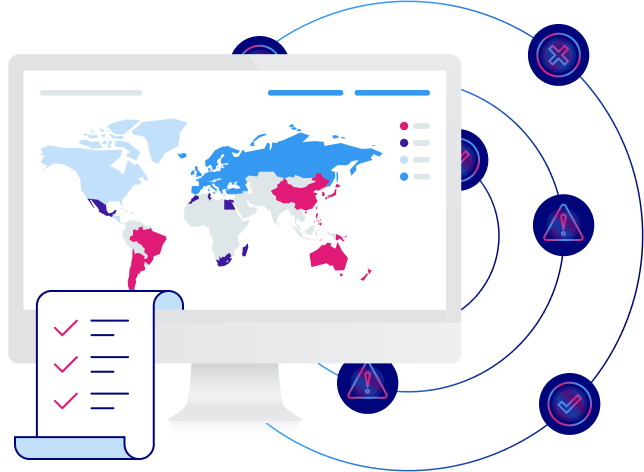-
Solutions
- AI Governance
- AI Risk
- Geo-Specific Cookie Banner
- Consumer Preference Management
- Data Subject Request Automation
- Data Mapping and Vendor Risk Management
- Privacy, Vendor, and Risk Assessments
- Privacy Program Management
- Regulatory Guidance
- Privacy Program Consulting
- Certifications and Verifications
- International Data Transfers
Forrester TEI ROI of Privacy ReportTrustArc commissioned a Forrester study to analyze the potential benefits of using our platform and the Forrester team found ROI linked to efficiency, compliance, and decreased cost in data breaches.
Read the report -
Products Products Privacy Studio Overview
Automate consent and data subject rights compliance. Design seamless privacy experiences to enhance customer trust across your digital landscape.
- Cookie Consent Manager Effortlessly manage cookie consent for global compliance, ensuring a secure, personalized browsing experience.
- Consent & Preference Manager Easily manage and orchestrate customer consent and preferences across brands and channels.
- Individual Rights Manager Automate and streamline DSR workflows to ensure compliance and show your commitment to customer rights.
- Trust Center Quickly centralize, manage, and showcase all trust and safety information in an easily customizable, no-code hub.
Products Governance Suite OverviewStay ahead of privacy and compliance regulations. Simplify data privacy management and ensure data governance with cutting-edge apps.
- PrivacyCentral Centralize privacy tasks, automate your program, and seamlessly align with laws and regulations.
- Data Inventory Hub & Risk Profile Gain full visibility and control of your data and accurately identify and mitigate risks.
- Assessment Manager Automate and score privacy assessments like PIAs and AI Risk, streamlining your compliance workflow.
- Nymity Research Get instant access to the latest in privacy regulations, legal summaries, and operational templates.
Products Assurance Services OverviewGain trust and credibility with leading privacy certifications from unbiased experts, backed by technology for unmatched privacy compliance assurance.
- Dispute Resolution
- TRUSTe Enterprise Privacy Certification
- TRUSTe EDAA Privacy Certification
- TRUSTe APEC CBPR and PRP Certification
- TRUSTe Data Collection Certification
- CCPA/CPRA Validation
- Data Privacy Framework Verification
- GDPR Validation
- Digital Advertising Alliance Validation
- TRUSTe Responsible AI Certification
-
Regulations
- EU General Data Protection Regulation (GDPR)
- California Consumer Privacy Act (CCPA)
- Virginia Consumer Data Protection Act (CDPA)
- NIST AI Framework
- ISO/IEC 27001
EU Artificial Intelligence Act (EU AI Act)EU's regulation on the use of AI and the world's first comprehensive AI law.
Learn moreData Privacy Framework (DPF)Transatlantic data transfer mechanism for EU-U.S., UK, and Swiss-U.S. commerce.
Learn more - Resources
- Contact us
Family Educational Rights and Privacy Act (FERPA)
FERPA is a U.S. federal law that protects the privacy of students’ education records by bestowing parents and/or eligible students with more autonomy over their education records, and prohibits educational institutions from disclosing personally identifiable information within education records without written consent from an eligible student and/or parent.
Are you subject to FERPA?
-
FERPA applies to any public or private elementary, secondary, or post-secondary school, state or local education agency that receives funds from an applicable program of the U.S. Department of Education.
-
Some parochial and private elementary and secondary schools may not receive funding under any program administered by the U.S. Department of Education, and are therefore not subject to FERPA.
Key obligations of FERPA
Annual notifications
All educational agencies and institutions shall annually notify parents and/or eligible students of their rights under FERPA, including the right to:
- Access student education records;
- Correct student education records;
- Partial control over the disclosure of personally identifiable information contained within their education records; and
- Consent to the disclosure of personally identifiable information contained within the education record.
Right to hearings
Educational agencies or institutions shall establish procedures to provide parents and/or eligible students a hearing to challenge the content of the student’s education records where it is demonstrated that the education record is inaccurate or in violation of the privacy rights of the student. Educational agencies or institutions shall organize a hearing in a timely manner after it has received the request for a hearing.
Record retention
Educational agencies or institutions must retain a record of each access request to and each disclosure request of personally identifiable information from students’ education records. Records must include the:
- Parties who have requested or received personally identifiable information from the education records; and
- Legitimate interests of the parties for requesting or obtaining such information.

Building Trust and Competitive Advantage: The Value of Privacy Certifications
Join our experts in this webinar as they go over the importance of how privacy certifications can unlock business value and help you stay ahead of the competition in today’s privacy-conscious landscape.
Achieve Compliance
-
Privacy program development and compliance management Identify gaps and track compliance with PrivacyCentral – assess FERPA regulation requirements and automatically get insights and reporting for a sustainable privacy program.
-
Regulatory guidance and operational templates Stay ahead of regulatory changes with expert guidance, ensuring your security and privacy practices remain compliant and up to date. Utilize expert written operational templates for sample policies, checklists, and more.

FAQs
- What is an eligible student under FERPA?
- Are there exceptions under FERPA when educational agencies or institutions are permitted to disclose information from a students’ education record?
- Does FERPA permit the disclosure of personally identifiable information from education records to officials of a state’s juvenile justice system?
- How long does an educational agency or institution have to comply with a request to view records?
- Do students under the age of 18, not in college, and not in the physical care of a parent or guardian, have rights under FERPA?
- Can educational agencies or institutions request a fee from parents and/or eligible students for copies of the student’s education record?
The information provided does not, and is not intended to, constitute legal advice. Instead, all information, content, and materials presented are for general informational purposes only.




